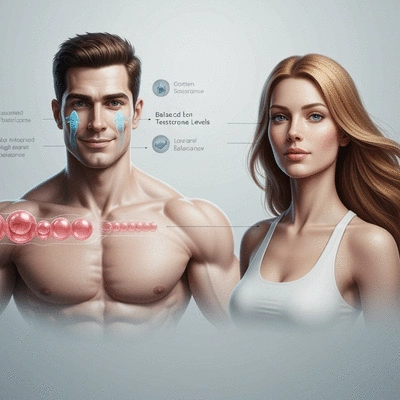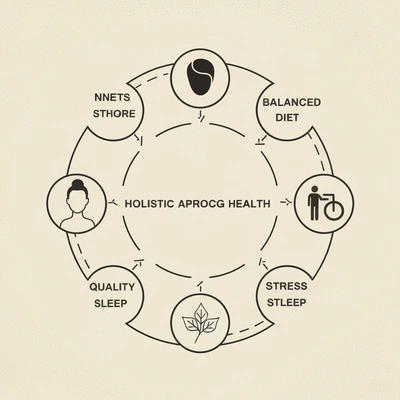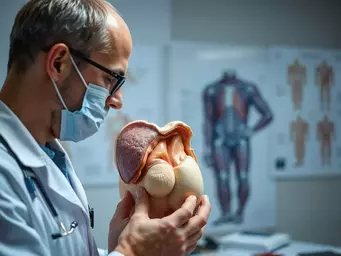Nutrition (Dietary Impact)
Focus on nutrient-dense foods to provide essential vitamins and minerals for hormone production. A balanced diet supports overall wellbeing.
- Improved Energy Levels
- Enhanced Mental Clarity
- Better Mood Regulation
Did you know that maintaining optimal testosterone levels is essential for both physical and mental health? This hormone influences everything from muscle mass to mood regulation. Understanding its importance can empower you to take control of your well-being.
Achieving optimal testosterone levels involves a holistic approach, focusing on diet, exercise, sleep, and stress management.
Focus on nutrient-dense foods to provide essential vitamins and minerals for hormone production. A balanced diet supports overall wellbeing.
Engage in a mix of resistance training and cardiovascular exercise to stimulate testosterone synthesis and muscle growth.
Prioritize high-quality sleep (7-9 hours) as it is crucial for hormone regulation and overall bodily repair and restoration.
Implement techniques to lower cortisol levels, as chronic stress can negatively impact testosterone production and mood.
When we talk about testosterone, it’s crucial to recognize its role as one of the primary male hormones, though it is essential for both men and women. This hormone is a powerhouse that supports various bodily functions, including muscle mass, fat distribution, bone density, and even mood regulation. Understanding testosterone's importance sets the stage for grasping how its fluctuations can impact our daily lives.
Imagine testosterone as the fuel that keeps your body running smoothly. Low levels can lead to a range of health issues, making it vital to keep these levels balanced. As an endocrinologist, I’ve seen first-hand how achieving optimal testosterone levels can greatly enhance overall health and vitality.
Testosterone is produced mainly in the testes in men and the ovaries in women, with small amounts produced in the adrenal glands. It plays a significant role in developing male physical characteristics and is crucial for maintaining sexual health and reproductive functions. For women, testosterone contributes to bone strength, muscle mass, and overall well-being. For more detailed information on how lifestyle changes can increase testosterone levels, especially in older men, consider exploring resources like this article from University of Utah Health.
It’s clear that maintaining healthy testosterone levels is vital for both men and women. At Hypogonadal Health, we focus on educating individuals about the impacts of testosterone deficiency and the importance of seeking appropriate treatment.
Low testosterone levels can significantly affect your day-to-day activities. You may find yourself experiencing fatigue, reduced motivation, or even difficulties with concentration. Imagine waking up feeling drained even after a full night’s sleep—this could be a sign of low testosterone! Research published in PMC NCBI further elaborates on the endocrine-disrupting chemicals that can impact testosterone levels.
Addressing these symptoms is essential. Consulting a healthcare professional to evaluate your hormone levels is the first step toward reclaiming your energy and zest for life.
Did you know that testosterone isn’t just about physical health? It plays a critical role in mood regulation too! Low testosterone can lead to feelings of irritability, depression, or anxiety, which can affect your relationships and overall quality of life. The connection between lifestyle strategies and preventing age-related decline in testosterone is further explored by Harvard Health.
A balanced hormone level can promote a healthier mindset, making it easier to navigate life’s challenges. If you’ve noticed changes in your mood or emotional state, it’s worth exploring the connection with your testosterone levels.
Taking proactive steps to understand and balance your hormones is crucial for both your mental health and overall well-being. At Hypogonadal Health, we provide resources to help you gain clarity on these important issues.
Testosterone is a vital hormone produced mainly in the testes in men and ovaries in women. It is essential for muscle mass, fat distribution, bone density, and mood regulation. Maintaining optimal levels is crucial for overall physical and mental health.
Low testosterone levels can manifest as fatigue, reduced motivation, difficulty concentrating, memory issues, decreased libido, irritability, depression, and anxiety.
A holistic approach involving a balanced diet, regular physical activity (resistance training and cardio), adequate high-quality sleep (7-9 hours), and effective stress management techniques can naturally boost testosterone levels and improve overall hormone balance.
A diet rich in nutrient-dense foods, providing essential vitamins and minerals, is fundamental. This approach helps improve energy levels, mental clarity, and mood, all contributing to better hormone production.
Chronic stress increases cortisol levels, which can negatively impact testosterone production. Implementing stress-reducing techniques like yoga or meditation can help lower cortisol, reduce irritability and anxiety, and improve emotional stability.
What do you think about the impact of testosterone on your daily life? Have you noticed any changes in your energy levels or mood? Share your thoughts below:
Boosting testosterone levels isn't just about one single change; it’s a blend of diet, exercise, sleep, and stress management working in harmony. At Hypogonadal Health, we believe in a holistic approach that addresses all aspects of your lifestyle. By understanding how these factors interplay, you can make informed decisions that lead to improved hormone health.
Consider these key areas for a balanced approach:
By actively combining these elements, you're setting the stage for optimal hormone balance. It’s not just about one or two changes; it’s about creating a lifestyle that supports your health.
Creating a personalized action plan is essential for your journey toward better testosterone levels. Start by assessing your current lifestyle and identifying areas for improvement. Here’s a simple framework to help you get started:
By following this structured plan, you can gradually implement changes and track your progress. Remember, it’s about making manageable shifts rather than overwhelming yourself with drastic alterations!
A balanced diet is fundamental not only for testosterone production but for your overall wellbeing. The right foods can significantly enhance your energy levels, mental clarity, and mood. Here are some benefits of maintaining a balanced diet:
At Hypogonadal Health, we emphasize the importance of nutrient-dense foods rich in vitamins and minerals. This approach not only aids in testosterone production but also contributes to a vibrant, fulfilling life.
Starting your journey toward healthier testosterone levels requires commitment and an open mind. Remember, changes won’t happen overnight, but every small step you take contributes to your overall health. Get excited about the possibilities that lie ahead!
As you commit to making lifestyle changes, it’s essential to know what to expect along the way. Here are some common experiences you might encounter:
Be patient with yourself! These changes take time, and consistency is key.
Staying persistent and consistent is vital in your quest for hormone balance. There will be hurdles to overcome, but every effort counts. Surround yourself with supportive people—friends, family, or even online communities can provide the encouragement you need. Keep reminding yourself why you started this journey!
At Hypogonadal Health, we’re here to support you every step of the way. Embrace the process, celebrate your victories, and take charge of your health. Remember, you’re not alone in this journey—together, we can achieve optimal testosterone levels and enhanced wellbeing!
Here is a quick recap of the important points discussed in the article:



 What if the key to unlocking your vitality lies in understanding the hormones that influence your bo
What if the key to unlocking your vitality lies in understanding the hormones that influence your bo
 Recognizing that your environment can significantly influence your hormonal health is crucial. Have
Recognizing that your environment can significantly influence your hormonal health is crucial. Have
 Have you considered how fluctuations in your testosterone levels might affect your daily energy and
Have you considered how fluctuations in your testosterone levels might affect your daily energy and
 Trauma to the testicles can have profound effects on hormonal health, but understanding the causes a
Trauma to the testicles can have profound effects on hormonal health, but understanding the causes a